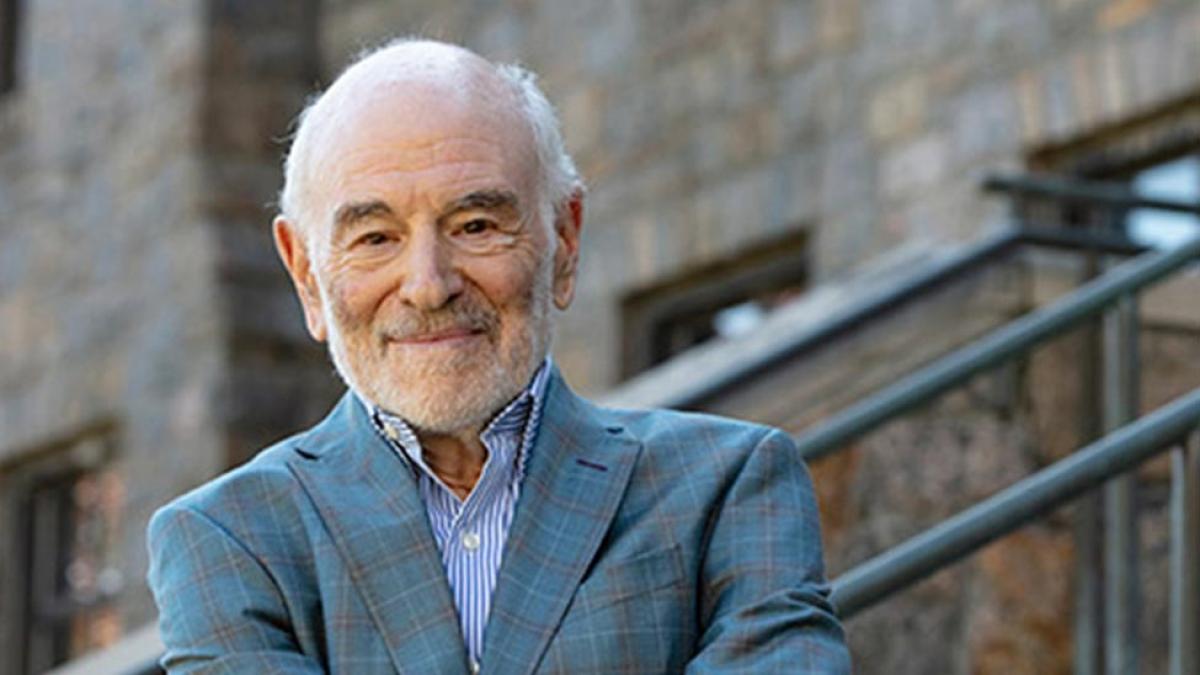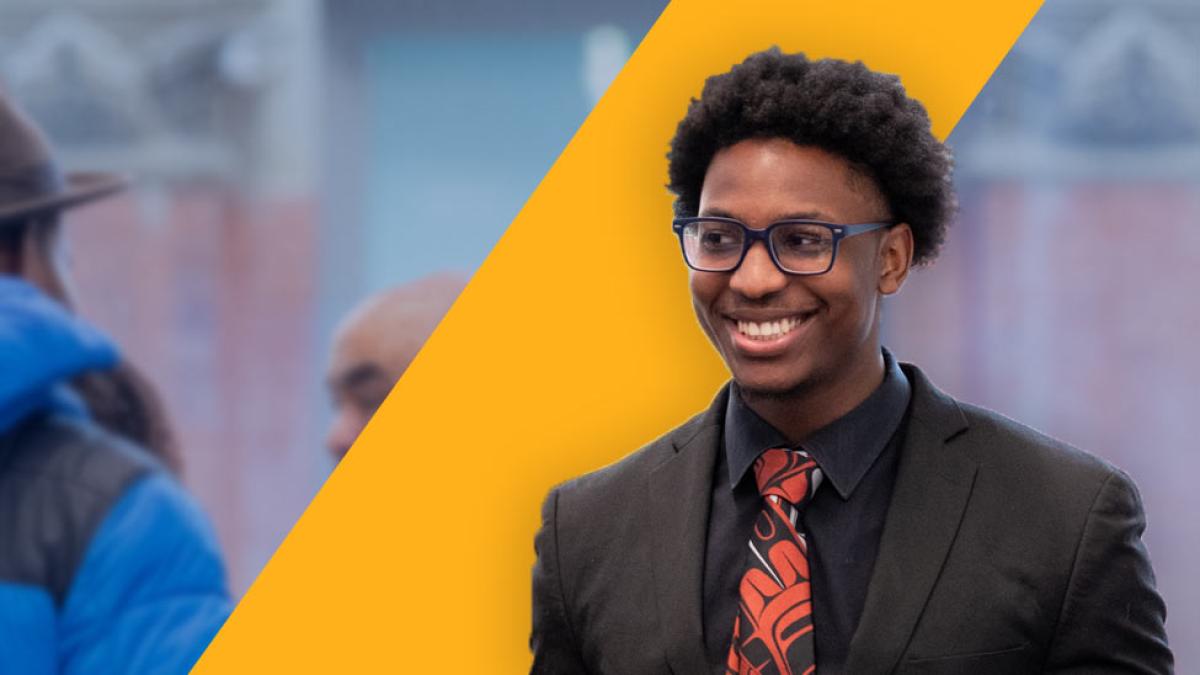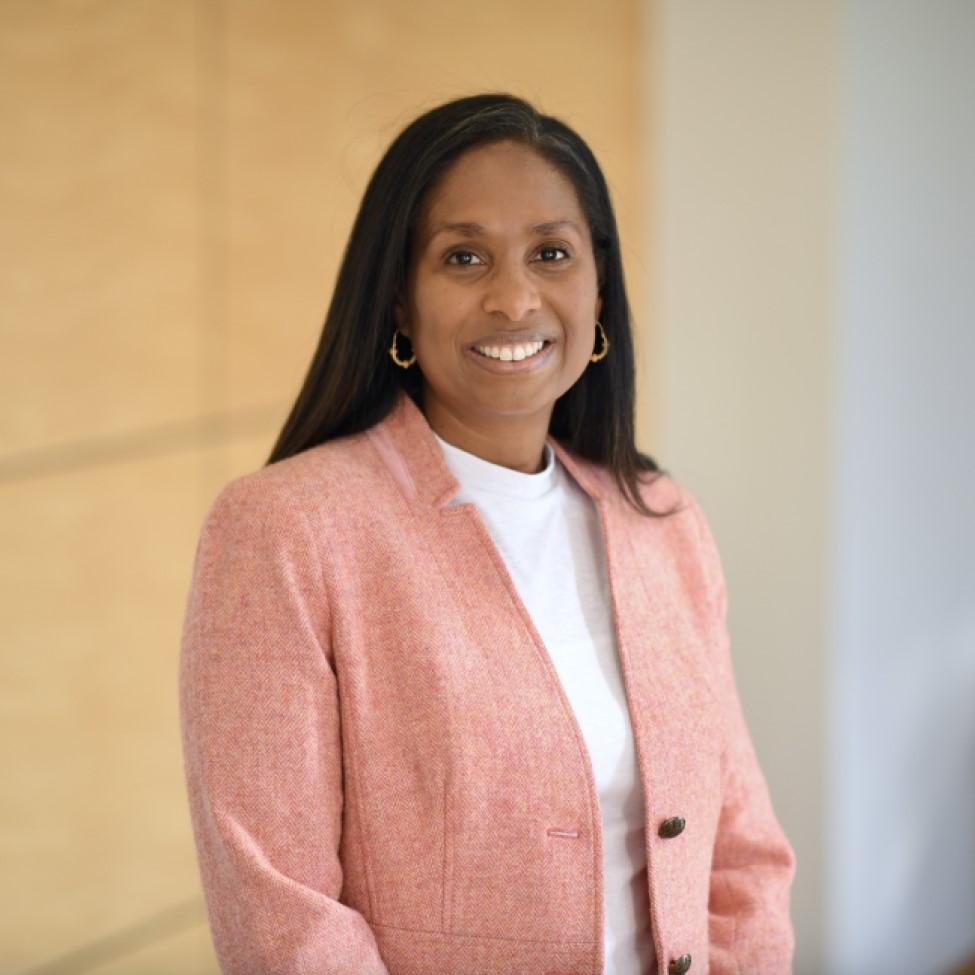
Faculty Focus: Visiting Assistant Professor of Law Salihah Denman
A first-generation immigrant from Suriname, South America who is fluent in Dutch, Professor Salihah Denman is the first person in her family to become a lawyer in the United States. She attended Howard University School of Law and obtained an LLM from American University’s Washington College of Law. Her passion for academia and working with students has been a driving force throughout her career.
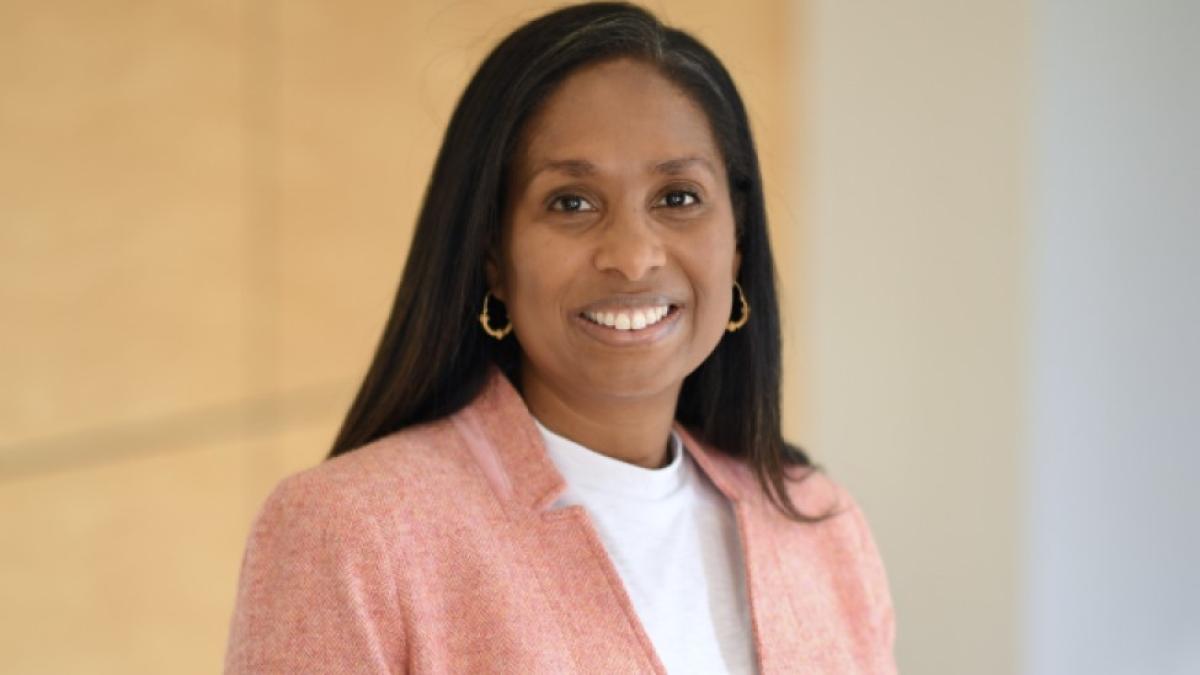

A first-generation immigrant from Suriname, South America who is fluent in Dutch, Professor Salihah Denman is the first person in her family to become a lawyer in the United States. She attended Howard University School of Law and obtained an LLM from American University’s Washington College of Law. Her passion for academia and working with students has been a driving force throughout her career. Currently, she is a Visiting Assistant Professor of Law at Haub Law and Director of Student Diversity Initiatives for the New York State Judicial Institute and Director of the Institute’s New York Legal Educational Opportunity (“NY LEO”) program. Learn more about Professor Denman in this Q&A.
How has your background as a first-generation immigrant from Suriname, South America impacted your career and outlook?
My background has allowed me to connect with first generation law students and lawyers. When I went to law school it was like entering another world that spoke a different language. Navigating the silent syllabus was challenging. I enjoy being a support for law students and aspiring lawyers by helping to guide them on their journey.
Can you talk a bit about your passion for academia and how that evolved?
My passion for academia and working with students has been a driving force throughout my career. Teaching legal practice at New York Law School was a transformative experience, allowing me to share my enthusiasm for the law with eager students. When I had the chance to teach Family Law at Haub Law, it sparked a deeper realization of my desire to share this specialized area of law with the next generation of legal minds. I thrive on the opportunity to examine legal issues through both macro and micro lenses, and being part of the scholarly community allows me to contribute meaningfully to the ongoing discourse.
Your research interests and areas of expertise include Family Law and Children and the Law – what is it about those areas that hold your interest?
I am interested in these areas because they impact the very fabric of our society. Issues in these areas can have lifelong traumatic effects on families. There are also a lot of negative aspects of the system that can have dire consequences for children including the foster care to prison pipeline.
Can you talk about your role with the Judicial Institute and the New York Legal Educational Opportunity (“NY LEO”) program?
I have the opportunity to expose students to the law from a very young age. We have programs beginning in middle school all the way to students pursuing law school. NY LEO is a program that bridges the gap for students who do not have access to people within the legal community to guide them. It also exposes them to some of the concepts and cases for first year doctrinal courses.
What are some of your current research interests and projects?
I am interested in procedural and evidentiary safeguards in the child welfare system. My present project focuses on evidentiary burdens in child removal proceedings.
As a professor you are tasked with teaching students, but what have you also learned from them in return?
Our students have such resiliency and dedication to becoming great lawyers. Their intellectual curiosity always adds additional layers of analysis and thought to our in-class discussions.
What advice do you have for law students?
To follow your dreams and know that you will be successful in your careers. Law is not always a straight line; every part of your journey will contribute to your success.
Aside from law, how do you spend your spare time?
I love to spend time with my husband and two daughters. I love to read and also really enjoy traveling. My favorite place that I have traveled so far is Croatia.
The Importance of Professional Development: Kyomi Gregory-Martin, PhD, CCC-SLP
Our next feature for our "The Importance of Professional Development" series is Kyomi Gregory-Martin, PhD, associate professor for the Communication Sciences and Disorders program.
This past December, Dr. Gregory-Martin was awarded the Certificate of Recognition for Special Contributions in Multicultural Affairs from the American Speech-Language Hearing Association (ASHA). We connected with her to discuss this award and the importance of making a commitment to diversity in one's professional career.


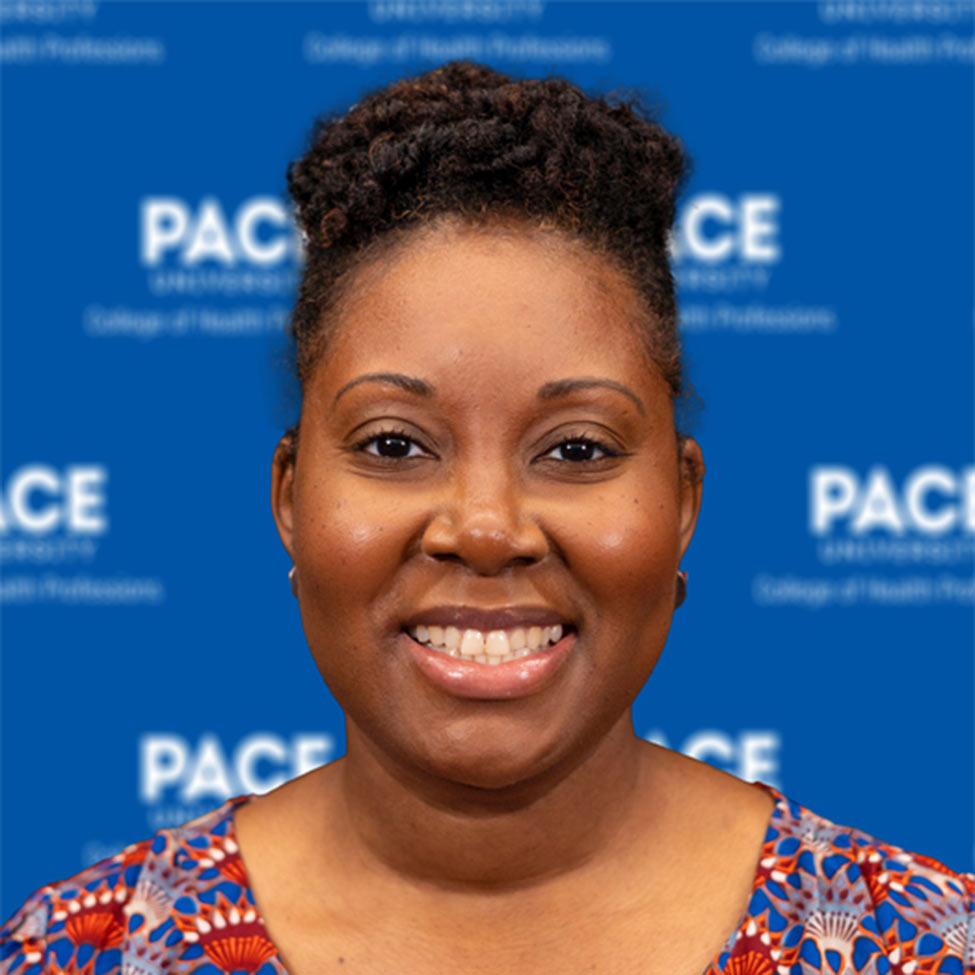
Kyomi Gregory-Martin, PhD is a celebrated associate professor for the Communication Sciences and Disorders program at Pace University and a multi-award-winning leader in the speech pathology field.
Most recently at Pace, Dr. Gregory-Martin received the 2024 College of Health Professions Dean’s Award for Outstanding Scholarship and Research. This past December, she received the American Speech-Language Hearing Association (ASHA) Certificate of Recognition for Special Contributions in Multicultural Affairs for excellence in multicultural service, research, and teaching. We connected with her to discuss this award and the importance of making a commitment to diversity in one's professional career.
Why is advocating and making diversity a commitment important?
It's important because it impacts everybody. Everyone has a culture. I feel like it's important for us to commit to providing the best service and quality possible for whatever culture that we encounter.
How does your passion for multicultural advocacy impact your work?
I'm passionate about it. I'm passionate about everyone working with each other regardless of their cultural background and the identities that they carry. It definitely carries over into the work that I do as a speech-language pathologist and as a professor. I want my students to be prepared for a diverse world where they're likely to work with people who are not exactly the same as them and to be able to provide effective, culturally responsive care, regardless of who the person is.
That can mean that even if someone shares the same neighborhood as someone, or the same race as someone, it doesn't mean that they're exactly the same because they haven't been raised with the same beliefs and ideas as you. You always must expect and recognize that you're going to have to respond to someone differently based on their perspective and how they grew up.
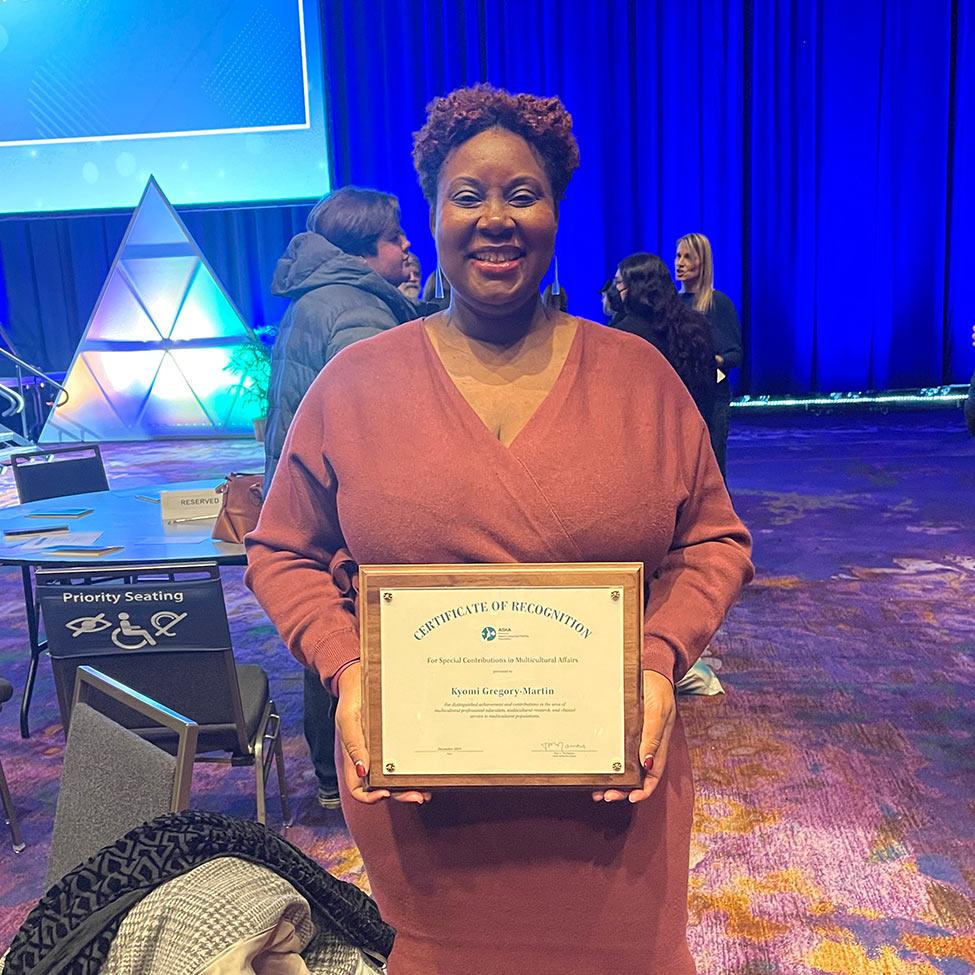
How does it feel to be recognized as a leader in multicultural affairs in your field by the American Speech-Language Hearing Association (ASHA)?
It's really special and gratifying for me. I've been doing this work for a long time, even before I got my PhD. I worked in Louisiana - just about being able to have dialogue with others around race – and helping work with the police department in Baton Rouge to have conversations with high school students or teens about how to have effective communication. And that work has spilled over into the work I do in speech language pathology in terms of being able to provide care for others.
Getting the award (ASHA’s Certificate of Recognition for Special Contributions in Multicultural Affairs) has been over a decade of work that I've been doing not only in research, but in teaching and in service. I did a lot of service work for the National Black Association for Speech Language Hearing, including helping to launch their cultural humility task force and now they do a fully online Cultural Humility Conference as well as the Cultural Humility Ambassadors Program. And while I no longer am in leadership with that organization, I was really excited about leading some of those initiatives that are still happening.
How does joining a professional organization like ASHA help further your career as a speech language pathologist?
I think it's so important to get visibility and being a part of these national organizations because you have an opportunity to talk to others who are in other parts of the country and world, that are part of the same work that you're doing, sharing experiences, making changes – and these may even be changes to like policy documents in your profession - and being able to collaborate on those things.
We can't operate in a silo. Working in a silo is only going to impact the piece of the world that you're connected to in that direct space. We have to continue to try to do things where we build webs, and that's how you're going to make change. Creating these webs and working with others who are in other places doing similar work as you and also learning from them.
How do you navigate interprofessional partnerships where you might have one goal, but your colleague has another?
Well, there's a lot of interprofessional practice that takes place as a speech language pathologist. And that's something I really speak a lot about to my students. The fact that you're going to be working with other professionals who have different ideas about how to approach the same client, but the goal is to provide the most effective care. And part of it is one of the pillars of cultural humility, which is this idea of moving towards egolessness.
I always think, if all of us could leave our ego at the door, we would provide better care where it's not just about saying, “well, I think this is what has to be done because of my training”, but more so saying, “okay, this is the perspective I'm coming from. Let me hear what those other professionals think, and let's come to the best decision for our client.”
In terms of providing care that's collaborative care; I think that that's an important way to look at it. So even though people might think, interprofessional practice doesn't really have anything to do with cultural humility, it does because you need to have humility to work with others to really further the process of your clientele and make it not about you.
What are some key takeaways you have learned in your career that you want to share with the PACE community?
Cultural humility is an ongoing process. Working with others is an ongoing process. You're not going to just wake up one day and be able to know what to do with everybody. Throughout your career, you're always going to encounter situations where you work with someone, or you're not sure of how to respond to them or to approach them.
I'm thinking about an encounter that I had when I was a clinical fellow working at a skilled nursing facility, and I had to do a swallowing evaluation for a patient who was Jewish. And I went in with the intention to carry out this evaluation as usual. I reviewed their medical records and walked in the same way I walk in with any client. And as I was about to start, the family was there and said, “you can't do this evaluation. The food isn’t kosher.”
And it may seem like something that you take for granted or that you think is small, but religious beliefs of someone in preparation of food was not something I had thought of before.
That was a definite pause for me. I had to go and speak to the dietician for the skilled nursing facility and then go speak to the kitchen because we didn't have a kosher kitchen. We implemented training for the kitchen staff to know how to prepare kosher meals and we had to research and find companies that prepared kosher food that had certain swallowing consistencies so that the nursing home could order those meals for that individual so that they could be able to assume their dietary needs.
That is just one example of being culturally responsive. I think people's definition of culture sometimes is very focused on one thing when it goes beyond that. It's all the elements that make you who you are.
What advice would you give students who are wanting to make a difference in their field but maybe nervous to take the necessary steps for change?
Well, I think especially during these times, we're moving into having to be brave in our spaces. And sometimes looking for equitable care and equitable opportunities for all may not just be speaking out when you see something that's not okay, or something that's not fair for both you and your clients.
I think this is such an important time for us to be able to know how and when to challenge the system and make changes. It's going to feel scary and you're going to feel like you don't you don't want to do it, or that you're scared to do it. But you have to always think about who is going to benefit from you saying something.
Anything else you’d like to share?
I just believe that this work is so important. I think even more so now considering how we're providing care to our clients and how we're communicating this information to our students. As we're becoming a more diverse and global world where, we have to have the perspective that there are going to be others who have opinions that differ from our own.
But how do we move forward in providing care and still working with others interprofessionally? That’s the key.
Professor Michael C. Dorf Explores 'Play in the Joints' in 2025 Dyson Distinguished Lecture at Haub Law
On Monday, February 10, 2025, the Elisabeth Haub School of Law at Pace University welcomed Professor Michael C. Dorf, Robert S. Stevens Professor of Law at Cornell Law School as the speaker for the 2025 Dyson Distinguished Lecture. His lecture was entitled: “Play in the Joints of the Religion Clauses and Law More Broadly.”
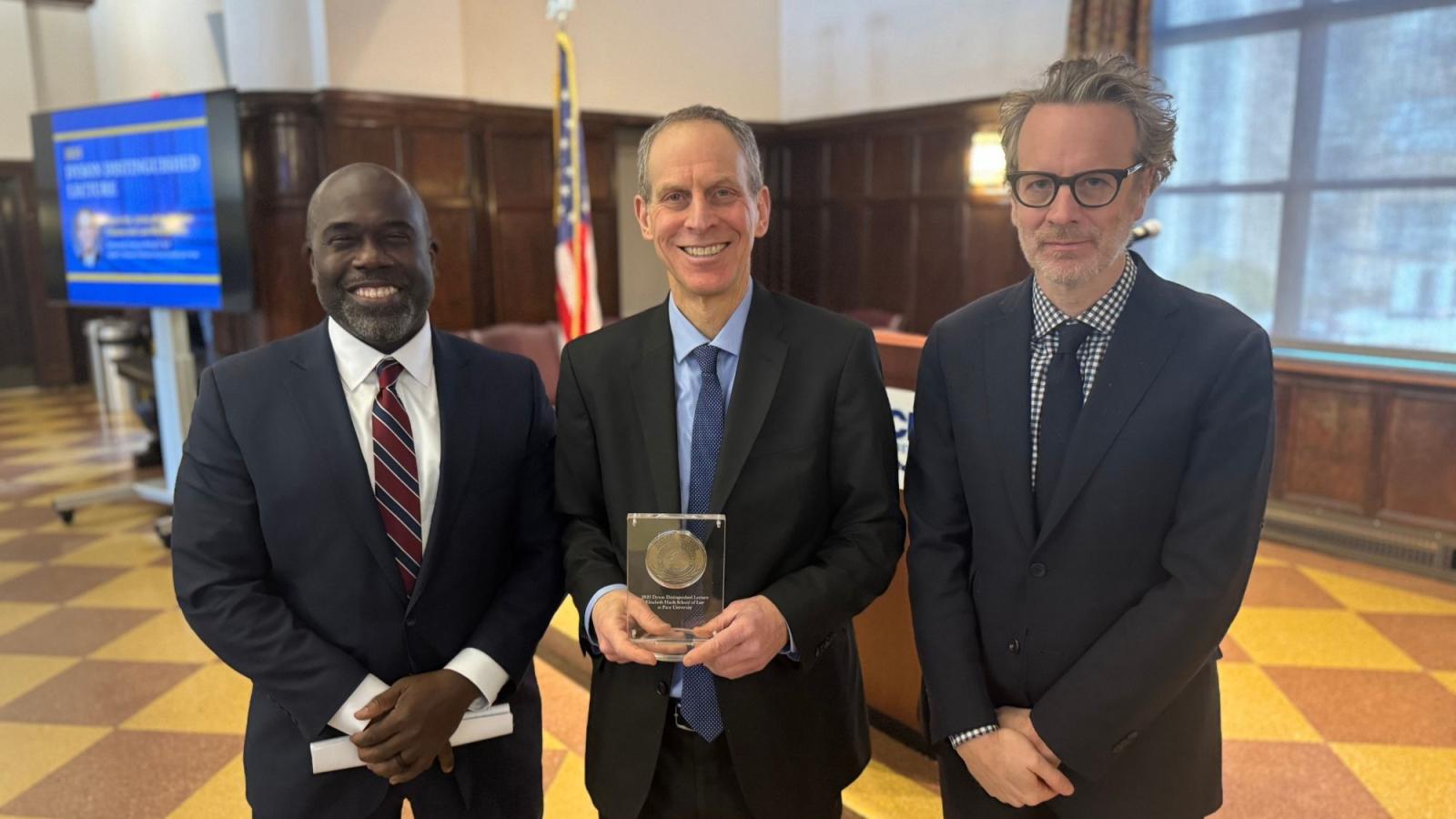
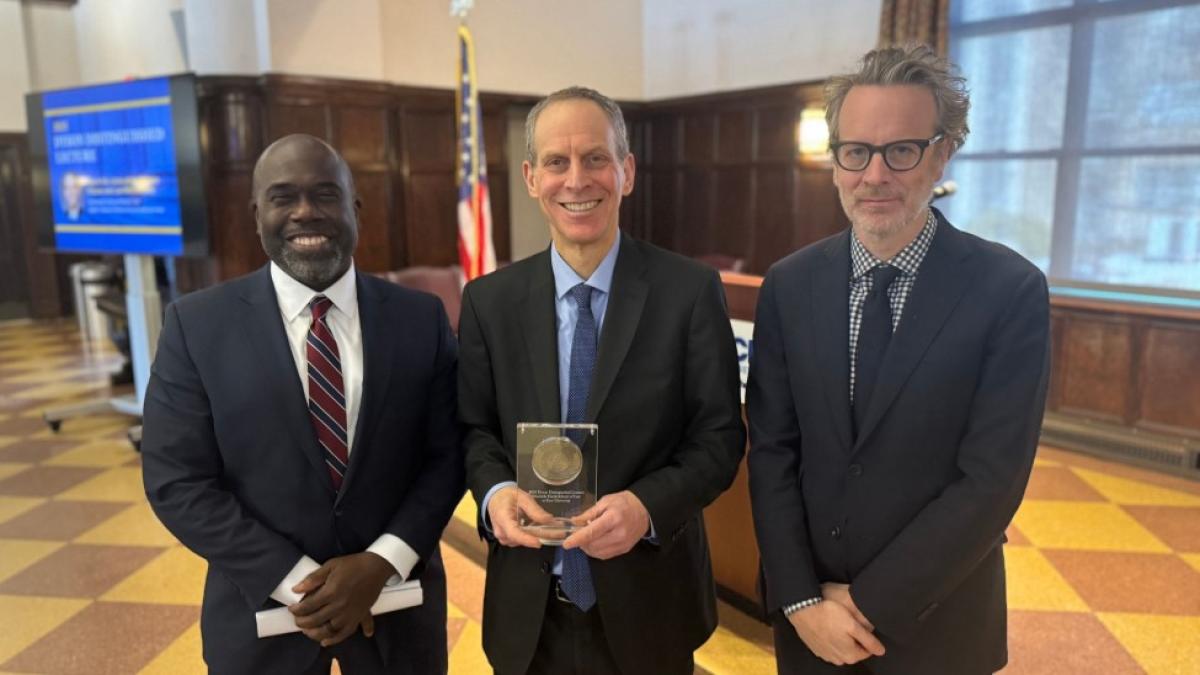
On Monday, February 10, 2025, the Elisabeth Haub School of Law at Pace University welcomed Professor Michael C. Dorf, Robert S. Stevens Professor of Law at Cornell Law School as the speaker for the 2025 Dyson Distinguished Lecture. His lecture was entitled: “Play in the Joints of the Religion Clauses and Law More Broadly.”
Professor Dorf’s lecture took as its starting point a view articulated by the late Chief Justice Rehnquist, writing for a majority of the Supreme Court in Locke v. Davey, 540 U.S. 712 (2004): “there are some state actions permitted by the Establishment Clause but not required by the Free Exercise Clause.” He used this case as a basis to examine the title of his lecture and the origin of the phrase “play in the joints.” Although Professor Dorf explained how recent cases involving the Constitution’s religion clauses erode this principle, he argued that “play in the joints” is a valuable principle in many domains involving conflicting legal obligations: the law ought not forbid whatever it does not demand; instead, it should leave substantial room for choice. One key example, he noted, involved conflicts between antidiscrimination law and free speech on campus.
While highlighting the functionality and benefits of allowing flexibility in legal interpretation, Professor Dorf also acknowledged its potential drawbacks. He noted that “play in the joints” – inevitably means that “whatever values you have on one side or the other, one or the other of them is going to be sacrificed a bit, relative to what you, the judge, or whoever it is, thinks is the ideal balance.” He elaborated that “allowing ‘play in the joints’ means allowing someone else to decide how to strike the balance between the values that conflict in the law.” Notably, he acknowledged that while “play in the joints” is a strategy for courts to use in construing potentially conflicting legal obligations, there are also lessons as well for lawmakers and constitution writers: “The lesson is that whenever possible try not to give actors subject to your regulatory authority conflicting legal obligations.”
Describing himself as a “value pluralist,” Professor Dorf emphasized that he along with other value pluralists “think there are a lot of things that are valuable – equality and liberty, for example” and as a result, sometimes those values come into conflict. He explained that it is not always possible to specify in exact detail all of peoples’ legal obligations, and so there is some uncertainty around the edges where there are zones of conflict that you don’t anticipate. Professor Dorf ended his lecture by stating that his hope is that going forward these conflicting legal obligations are construed “giving more ‘play in the joints.’”
To kick-off the lecture, Haub Law Dean Horace Anderson spoke about the history of the Distinguished Dyson Lecture and thanked Professor Dorf for delivering this year’s lecture. Haub Law Professor Alexander K.A. Greenawalt followed by introducing Professor Dorf. Following the lecture, Professor Dorf was presented with the Dyson Medal. He then participated in an insightful Q&A session with the audience. The conversations continued at a post-lecture reception held at Haub Law.
Michael C. Dorf is the Robert S. Stevens Professor of Law at Cornell Law School. He has written over one hundred law review articles and is the author, co-author, or editor of six books, including On Reading the Constitution (co-author Laurence Tribe, Harvard University Press, 1991) and Beating Hearts: Abortion and Animal Rights (co-author Sherry F. Colb, Columbia University Press, 2016). His popular writing appears regularly in the web-based magazine Verdict and on his blog, Dorf on Law. Professor Dorf received his undergraduate and law degrees from Harvard. Before entering academia, Professor Dorf served as a law clerk for Judge Stephen Reinhardt of the U.S. Court of Appeals for the Ninth Circuit and then for Justice Anthony M. Kennedy of the Supreme Court. He maintains an active pro bono practice.
The Dyson Distinguished Lecture was endowed in 1982 by a gift from the Dyson Foundation and made possible through the generosity of the late Charles H. Dyson, a 1930 graduate, trustee, and long-time benefactor of Pace University. The principal aim and object of the Dyson Distinguished Lecture is to encourage and make possible scholarly legal contributions of very high quality in furtherance of Haub Law's educational mission. Prior Dyson lectures have been delivered by many distinguished guests, including Secretary of Homeland Security Jeh Johnson, Dr. Cornel West, and more recently family historian, author, and thought leader Chris Rabb and also Professor I. Glenn Cohen, the James A. Atwood & Leslie Williams Professor of Law and Deputy Dean of Harvard Law School.
Can NYC Keep Congestion Pricing Alive? Breaking Down The Legal Fight Between New York, Trump Administration
Elisabeth Haub School of Law Professor Bennett Gershman speaks with CBS News about the legal battle over NYC’s congestion pricing program, noting that a judge has already upheld the plan and that President Trump does not have the authority to overturn it.
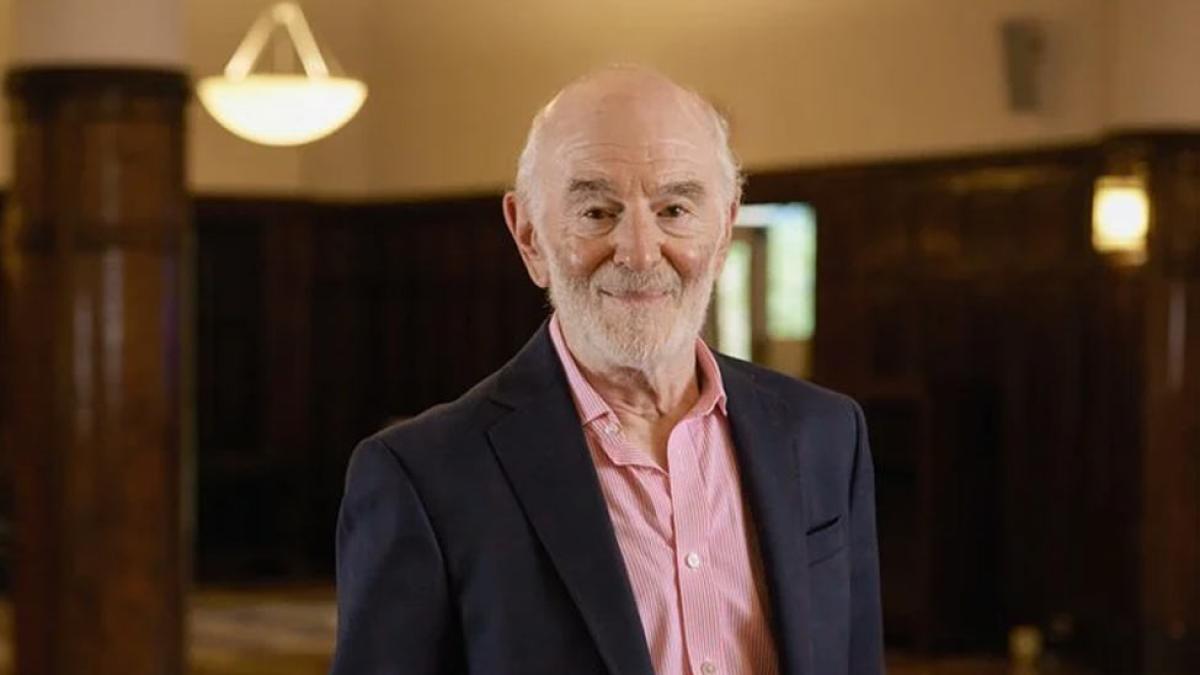
NY Gov. Kathy Hochul Under Pressure To Remove Embattled NYC Mayor Eric Adams From Office
Political Science Professor Laura Tamman offers expert analysis to USA Today on New York Governor Kathy Hochul’s response to NYC Mayor Eric Adams’ legal challenges.
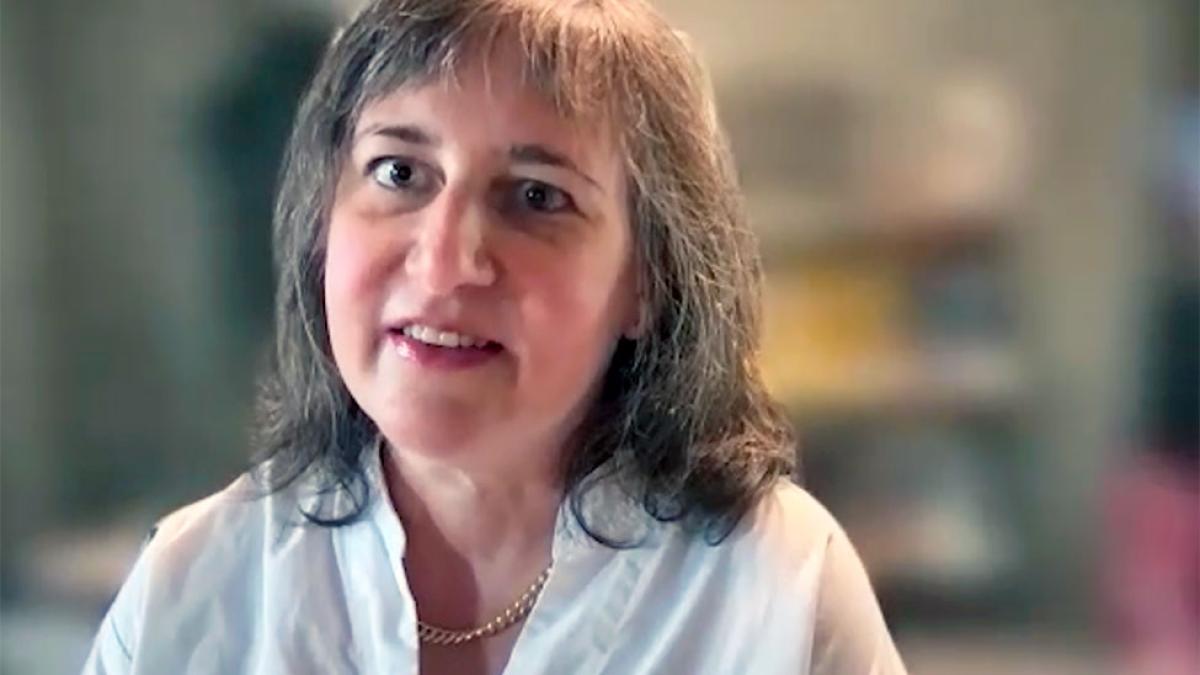
Trump-Appointed Judge Shoots Down His Immigration Proposal
Bennett Gershman, professor of law at Pace University, told Newsweek: "Trump's Executive Order seeking to outlaw so called Birthright Citizenship is itself unlawful and will be easily struck down. "Mr. Trump may not like the constitutional rule. But however much he would like to, he does not have the power to flout the Constitution. He would need to get Congress and the states to amend the constitution to implement his objective."
